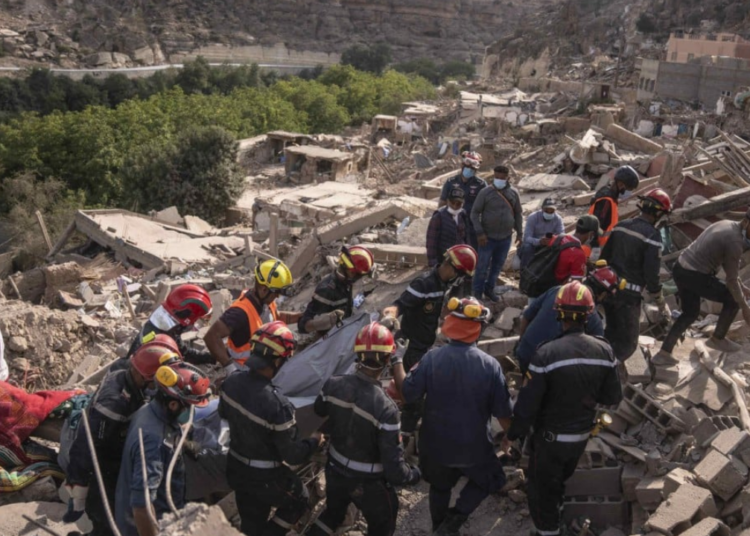The death rate – in thousands- after recent natural disasters in Morocco and Libya, tells so much about the health of the earth; climate change campaigners would say. But can anyone them? The issue is that numbers alone don’t tell the whole story of affected peoples after such unimaginable devastation.
Without doubt, something isn’t right when about 3000 people died in the earthquake that hit Morocco in early September. Reports indicate that the 6.8-magnitude earthquake was the deadliest in the country and surrounding areas in more than 120 years.
The world had barely come to terms with the Moroccan experience when the Libya flood disaster happened later in the same month. The death toll has continued to vary, with government officials and aid agencies giving tallies ranging from about 4,000 to 11,000 dead.
In the case of Morocco, rescue teams raced against the clock to find survivors from the rubbles of the earthquake that tore through that North African country.
Officials put the number of casualties at 2,800 while the United Nations Children’s Fund (UNICEF) said about 100,000 children have been affected.
The earthquake affected the south of Marrakesh and damaged buildings in major cities. The country’s interior ministry said the tremors were felt in neighbouring Algeria and Portugal.
Libya suffered from the effect of heavy one-day rain from Mediterranean storm, Daniel, which led to massive flooding across its shores which overwhelmed two dams. The resultant “wall of water” that tore through the coastal city of Derna, destroyed entire neighbourhoods and swept bridges, cars and people out to sea.
Scientists claim that the storm raged for four days and caused extensive damage in central Greece and parts of Bulgaria and Turkey, a region where such extreme storms are up to 10 times more likely and up to 40 per cent more intense because of climate change.
Before then there had been the reign of angry wildfires in Canada, Italy, and the United States, which, although not having high casualty figures, gave as much insight into how convulsed the earth is.
Indeed, these wild fires have raged on for decades, perhaps, in protest against how man has treated his environment.
These tragedies point to an urgency to appease Mother nature buffeted on all sides by mindless competition by countries to outdo one another in the struggle to control resources perceptibly needed for development regardless of the harm on humanity itself.
For over a century, greenhouse gases have been pumped into the atmosphere in the quest for industrialisation. Modern civilisation is, ostensibly, built on the back of this exploitation.
Recently, there have been renewed quest to address the damage and perhaps halt further degradation of the world. The United Nations (UN) have been coordinating efforts to reach a consensus on how to resolve this crisis. Tagged Conference of the Parties of the UNFCCC (COP), a series of these meetings have been held in different countries.
The last in the series of these meetings was the 27th edition held in November 2022. It was hosted by the Government of the Arab Republic of Egypt with a view to building on previous successes and paving the way for future ambition to effectively tackle the global challenge of climate change.
Dogged by varied disagreements among member states for decades – largely due to fear of economic losses and falling off the industrial pecking order, developing nations who had relentlessly pushed for a fund to halt their push for industrialisation in the mold used by the industrialised nations, finally succeeded in getting the backing of wealthier polluters who have been long fearful of open-ended liability.
During the conference, financial pledges were made as compensation for losses and damages from multiple countries including: Austria, Belgium, Canada, France, Germany, and New Zealand, joining Denmark and Scotland, which had made pledges previously.
After the meeting, a statement from the Alliance of Small Island States, comprising islands whose very existence is threatened by sea levels rising abnormally, said the loss and damage deal was “historic”.
But how much of such commitment has been redeemed? Perhaps, in the 28th session of the Conference of the Parties (COP28) which will be held at Expo City, Dubai in the United Arab Emirates (UAE), later this month, a clear picture may emerge.
But what is not in doubt is the need for urgency to address this challenge that we face as a global community.
Back home, the National Emergency Management Agency (NEMA), has renewed its earlier warning of imminent flood disaster in Benue, Kogi, and six other states following the recent release of water from the Cameroon Lagdo Dam.
Other states to be affected are Taraba, Nasarawa, Anambra, Edo, Delta and Bayelsa, with Adamawa already affected; the Director General of NEMA, Mustapha Ahmed, raised the alarm during an emergency meeting with stakeholders in Abuja.
The Cameroonian government had, in August, written to NEMA on the country’s plans to open the Lagdo Dam floodgate, advising Nigeria to take proactive steps to mitigate damages. Nigeria was expected to sensitise her citizens living around the regions that might be affected by the released water.
Of course, the horrors of the last devastation come to mind. We can only hope that authorities do the needful this time around.





